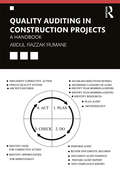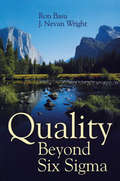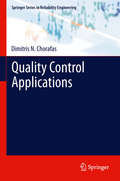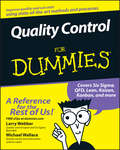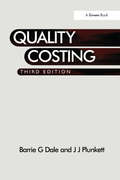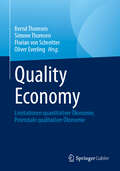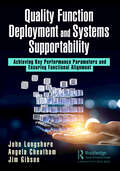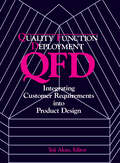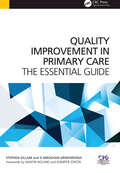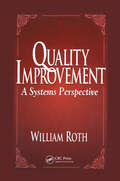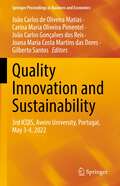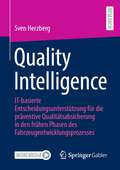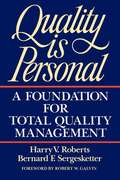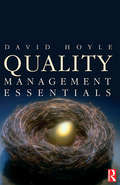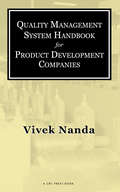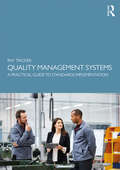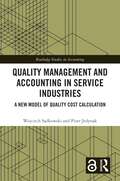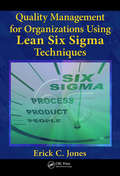- Table View
- List View
Quality Auditing in Construction Projects: A Handbook
by Abdul Razzak RumaneThis book provides construction professionals, designers, contractors and quality auditors involved in construction projects with the auditing skills and processes required to improve construction quality and make their projects more competitive and economical. The processes within the book focus on auditing compliance to ISO, corporate quality management systems, project specific quality management systems, contract management, regulatory authorities’ requirements, safety, and environmental considerations. The book is divided into seven chapters and each chapter is divided into numbered sections covering auditing-related topics that have importance or relevance for understanding quality auditing concepts for construction projects. No other book covers construction quality auditing in such detail and with this level of practical application. It is an essential guide for construction and quality professionals, but also for students and academics interested in learning about quality auditing in construction projects.
Quality Beyond Six Sigma: A Lean Approach To Building Sustainable Quality Beyond Six Sigma
by Ron Basu Nevan WrightSix Sigma is a data-driven management system with near-perfect performance that is a statistical target of operating with no more that 3.4 defects per one million chances. Six sigma has both created avid interest and raised concerns among executives and its practioners. This is all very well for multinationals like Motorola or General Electric but how can it help small and medium-sized enterprises or the service industry? How do you ensure that solutions stick? Quality Beyond Six Sigma responds to this challenge and provides a practical implementation of the issues of Six Sigma, Lean Enterprise and Total Quality and aligns the 'hard' sigma message with the softer sustainable 'strategic issues'. The result is FIT SIGMA.The authors utilize major and minor case studies to support principles and learnings of FIT SIGMA and include review examples and self-assessment that underpin the sustainable process. The three major case studies are contributed by General Electric, Dow Chemical and Seagate Technology.Senior Executives and Managers of organizations of all types and sizes, Management Consultants and Students of all disciplines will find this book a stimulating guide to quality and operational excellence.
Quality Control Applications
by Dimitris N. ChorafasQuality control is a constant priority in electrical, mechanical, aeronautical, and nuclear engineering - as well as in the vast domain of electronics, from home appliances to computers and telecommunications. Quality Control Applications provides guidance and valuable insight into quality control policies; their methods, their implementation, constant observation and associated technical audits. What has previously been a mostly mathematical topic is translated here for engineers concerned with the practical implementation of quality control. Once the fundamentals of quality control are established, Quality Control Applications goes on to develop this knowledge and explain how to apply it in the most effective way. Techniques are described and supported using relevant, real-life, case studies to provide detail and clarity for those without a mathematical background. Among the many practical examples, two case studies dramatize the importance of quality assurance: A shot-by-shot analysis of the errors made in the Fukushima Daiichi nuclear disaster; and the engineering failure with new technology due to the absence of quality control in an alternative energy project. This clear and comprehensive approach makes Quality Control Applications an essential reference for those studying engineering as well industry professionals involved in quality control across product and system design.
Quality Control for Dummies (For Dummies Ser.)
by Michael Wallace Larry WebberSo you’ve been asked to lead a quality control initiative? Or maybe you’ve been assigned to a quality team. Perhaps you’re a CEO whose main concern is to make your company faster, more efficient, and less expensive. Whatever your role is, quality control is a critical concept in every industry and profession. Quality Control For Dummies is the straightforward, easy guide to improving your company’s quality. It covers all of today’s available options and provides expert techniques for introducing quality methods to your company, collecting data, designing quality processes, and more. This hands-on guide gives you all the tools you’ll ever need to enhance your company’s quality, including: Understanding the importance of quality standards Putting fundamental quality control methods to use Listening to your customer about quality issues Whipping quality control into shape with Lean Working with value stream mapping Focusing on the 5S method Supplement a process with Kanban Fixing tough problems with Six Sigma Using QFD to win customers over Improving you company with TOC This invaluable reference is written from an unbiased viewpoint, giving you all the facts about each theory with no fuzzy coverings. It also includes steps for incorporating quality into a new product and Web sites packed with quality control tips and techniques. With Quality Control For Dummies, you’ll be able to speed up production, eliminate waste, and save money!
Quality Control with R
by Emilio L. Cano Javier M. Moguerza Mariano Prieto CorcobaPresenting a practitioner's guide to capabilities and best practices of quality control systems using the R programming language, this volume emphasizes accessibility and ease-of-use through detailed explanations of R code as well as standard statistical methodologies. In the interest of reaching the widest possible audience of quality-control professionals and statisticians, examples throughout are structured to simplify complex equations and data structures, and to demonstrate their applications to quality control processes, such as ISO standards. The volume balances its treatment of key aspects of quality control, statistics, and programming in R, making the text accessible to beginners and expert quality control professionals alike. Several appendices serve as useful references for ISO standards and common tasks performed while applying quality control with R.
Quality Costing
by Barrie G. Dale J.J. PlunkettQuality costs help to show the importance of quality-related activities to management; they demonstrate the cost of non-quality to an organization; they track the causes and effects of the problem, enabling the working out of solutions using quality improvement teams, and then monitoring progress. As a technique in the introduction and development of TQM, quality costing is a powerful tool for enhancing a company’s effectiveness. Quality Costing provides pragmatic advice on how to set about introducing and developing a quality costing system and using the data that emerges. This third edition (strengthened by additional data from a range of organizations) provides sound practical guidance on how to define, identify, collect, measure, analyse, report and use quality costs. This established text has proved invaluable to managers and quality professionals, students and academics alike - the new edition ensures its continued position as the leading book in the field.
Quality Economy: Limitationen quantitativer Ökonomie, Potenziale qualitativer Ökonomie
by Oliver Everling Bernd Thomsen Simone Thomsen Florian Von SchreitterDieses Buch informiert über drängende globale Herausforderungen, diskutiert Lösungsansätze, schafft ein besseres Verständnis für die Neudefinition von Wohlstand und dessen gerechte Verteilung und zeigt die Rolle und die Chancen einer qualitativen Wirtschaft auf. Es trägt dazu bei, die komplexen Themen, beispielsweise in den Bereichen Ressourcenmanagement, Technologie und sozioökonomische Systeme, zu beleuchten und Wege zur Bewältigung der Probleme aufzuzeigen. Es gibt Grund zum Optimismus, denn wir Menschen haben die Zukunft in der Hand! In gleichem Maße, wie wir die spanische Grippe, die Pest und Covid-19 in den Griff bekamen, werden wir auch nötige Veränderungen in der Wirtschaft so erfolgreich gestalten, dass wir die Herausforderungen meistern, die unser Planet und das Zusammenleben von uns Menschen erfordert. Ebenso klar ist den renommierten Autoren dieses Buches, dass eine Ökonomie, die nur quantitativen Zielsetzungen unterliegt, weder die aktuelle Lebenswirklichkeit noch künftige gesellschaftliche Anforderungen abzubilden vermag und damit nicht zukunftsfähig ist. “Wir brauchen eine Qualitative Ökonomie” - das ist die zentrale Botschaft dieses Buches. Wie diese genau aussieht, wie sie klassisches volks- und betriebswirtschaftliches Vorgehen ergänzt, welche Themenfelder dabei wichtig sind und künftig werden und warum das nicht nur zu qualitativ, sondern auch quantitativ besseren Resultaten führt, zeigt dieses Buch eindrucksvoll.
Quality Education and International Partnership for Textile and Fashion: Hidden Potentials of East Africa (SDGs and Textiles)
by Hafeezullah Memon Xinfeng Yan Lihong ChenThis book mainly focuses on SDG4- Quality Education, and aims to understand the past, present, and future of textile, fashion, apparel, and related study majors of East African countries. Professors and field experts in textile engineering of selected countries describe the potential and prospects of textile education and how it can lead to internationalization in the various chapters. It also discusses the textile university alliance and the potential for international education related to textiles in the developing region. With updated illustrations, images, data, graphs and tables, this book serves as a reference book for universities with textile engineering major in countries throughout the world.
Quality Engineering Handbook (Quality and Reliability)
by Thomas Pyzdek Paul A. KellerWritten by one of the foremost authorities on the subject, the Second Edition is completely revised to reflect the latest changes to the ASQ Body of Knowledge for the Certified Quality Engineer (CQE). This handbook covers every essential topic required by the quality engineer for day-to-day practices in planning, testing, finance, and management an
Quality Engineering: Off-Line Methods and Applications
by Chao-Ton SuAs quality becomes an increasingly essential factor for achieving business success, building quality improvement into all stages-product planning, product design, and process design-instead of just manufacturing has also become essential. Quality Engineering: Off-Line Methods and Applications explores how to use quality engineering methods and othe
Quality Function Deployment and Systems Supportability: Achieving Key Performance Parameters and Ensuring Functional Alignment
by John Longshore Angela Cheatham Jim GibsonThis book not only presents the overall development of quality function deployment (QFD) and what it has been used for to date but a new product support orientation by which it can be employed. It is product and service “system” focused and presents how blending the processes and elements of supportability and analysis into a QFD-modeled methodology can achieve optimal cost savings and performance efficiency and effectiveness. In addition, a working model is provided that will assist those that elect to use such an approach to current/new product and/or service development. QFD is widely spreading throughout the world because of its outstanding usefulness. It is aimed to fulfill the customer’s expectation of a product or service design. Organizations of all sizes are using it to (1) save product and service design and development time, (2) focus on how the product or service might satisfy the customer and (3) improve communication at all levels of an organization during the development process. Based on these three reasons, today's traditional QFD can be divided into three branches and analyzed. First, QFD can be implemented effectively for developing new products and designs by establishing the linkage between design stages through the manufacturing environment. However, research has found that traditional QFD is quite weak in implementing modifications to existing product and service design during its predicted lifecycle. Second, most research to this point has been squarely focused on the “voice of the customer” for prioritizing customer needs. While certainly needed, the “voice of the system” that is being used to produce the product/service and how they operate during its intended life cycle has been given less attention. Third, QFD is often viewed as overly labor-intensive and thus costly, and, because of its team-based development logic, manual in nature by those involved during its development and implementation. Research has shown that life cycle sustainment planning and support for current or proposed products and/or services requires a seamless and balanced life cycle support methodology. To achieve this type of support, twelve functional elements have been identified that form the product support infrastructure. A new approach, one that views product support as an integrative activity where all twelve product support elements are assessed over the entire product and/or service life cycle is being deployed. With this deployment comes a need to ensure Key Performance Parameters (KPPs) are achieved and functional alignment obtained by balancing supportability element cost and provisioning throughout the entire product and/or service lifecycle, not just during the development stage, and to view the system as the “customer” and thus listen to the “Voice of the System” when assessing supportability requirements. Quality Function Deployment (QFD) is such a tool. This book contains four sections. Section 1 provides an initial overview of QFD origins, and history and highlights some of its use today. It addresses how QFD fits within the organization, increasing revenue, and reducing cost. It outlines a step-by-step strategy for successfully deploying QFD within the organization. Section 2 examines the evolving product and/or service requirement, creating the design solution using QFD, assessing supportability characteristics using QFD, and performing functional supportability analysis using QFD. Section 3 provides a guide for developing the life cycle supportability solution using QFD methodology on an ongoing basis, and managing processes throughout the systems lifecycle. Section 4 addresses using QFD in an imperfect world and will provide insight into how to use QFD beyond the standard “house of quality” concept.
Quality Function Deployment: Integrating Customer Requirements into Product Design
by Yoji AkaoQuality Function Deployment (QFD) is a method for satisfying customers by translating their demands into design targets and quality assurance points. For a thorough "how-to" on the implementation of QFD, we went directly to the source -- Yoji Akao, the creator of QFD and one of the foremost leaders of the Japanese Total Quality Control movement.In this unprecedented book he explains the concepts and methods of this remarkable systems engineering approach. Filled with case studies, detailed charts, and over 100 diagrams, this book is a complete reference tool for QFD implementation. It includes— Use of the demanded quality deployment chart.Using and promoting quality charts.Using quality control process charts: QFD at the pre-production.Quality deployment and reliability deployment.Quality development in the construction industry.QFD for the service industry.QFD for software development.
Quality Improvement Customers Didn't Want (HBR Case Study and Commentary)
by Mary Jo Bitner Thomas O. Jones Teresa A. Swartz Eric Hanselman Christopher A. Swan Mary Jane Bitner Dawn Iacobucci Terri CapatostoIs investing in new technology always the right choice for a company and its customers? Allan Moulter, the CEO of Quality Care, isn't sure he wants to invest in the computerized reception system that consultant Jack Zadow has outlined for him. But in this HBR case study, the argument Zadow makes is impossible to ignore. Quality Care's rivals have invested in similar systems or are planning to do so. The new system promises to take care of routine busywork, freeing staff up for other interactions with patients. It seems as if the competition hasn't even cut staff and is counting on increased customer retention to pay for the investment. And yet, Quality Care's surveys of its own customers show that they prefer the human touch when checking in. How would customers feel if the first "person" they met when they came in the door turned out to be a machine? Six experts weigh the costs and benefits of technology in a service industry. In 96106 and 96106Z, commentators Thomas O. Jones, Mary Jo Bitner, Eric Hanselman, Christopher A. Swan, Teresa A. Swartz, and Terri Capatosto offer advice on this fictional case study.
Quality Improvement in Primary Care: The Essential Guide
by Stephen GillamThis book provides readers with an invaluable set of tools to convert the endless challenges for quality and myriad opportunities for improvement into meaningful and useful change. It considers how to manage primary care organisations in order to improve quality of care; how general practices are regulated and held accountable; various techniques used for assessing and measuring; and commonly used quality improvement frameworks.
Quality Improvement: A Systems Perspective
by William RothQuality improvement: it's an attractive concept on paper. So why do the vast majority of quality improvement efforts fail?William Roth knows from experience: as a Ph.D in systems theory, an ex-corporate manager, a professor-and the designer (with the AQP) of a national program to deliver training for quality credentials in the systems approach. His belief: enduring quality improvement is an "all or nothing" situation-requiring a systemic approach, with all the key components and integrations in place and fully integrated right from the start. Quality Improvement: A Systems Perspective explains the sometimes surprising historic roots of the quality improvement movement, and outlines the systems theory on which successful models must be built. Readers then gain access to the hands-on, nuts-and-bolts, how-to-get-it-done details of the five critical phases. Three case studies (two in industry, one in health care) support this traditional but currently shunned model.Along with his unique unified view of quality improvement, Roth explains why it is shunned, and why alternative approaches usually do not produce the desired results. Key obstacles to success are directly identified-top-level management, local union leaders, management education. The ultimate culprit, though, is culture-to which Roth suggests how to move organizations in the right direction, from a systems perspective.With one of the most comprehensive overviews of quality management essentials in one volume, Quality Improvement: A Systems Perspective balances theory and modeling with the details of real-life implementation and success.
Quality Innovation and Sustainability: 3rd ICQIS, Aveiro University, Portugal, May 3-4, 2022 (Springer Proceedings in Business and Economics)
by Gilberto Santos João Carlos Gonçalves dos Reis Joana Maria Costa Martins das Dores João Carlos de Oliveira Matias Carina Maria Oliveira PimentelThis book provides various approaches to complex industrial problems in sustainability, operations management and industrial engineering. It features in-depth research presented by academics, scholars, researcher and professionals at the 3rd International Conference on Quality Innovation and Sustainability (ICQIS) in the fields of quality, innovation, sustainability and operations management. It addresses topics such as quality management systems; Lean and Six Sigma; information systems for quality management; data management and industry 4.0; innovative solutions for quality challenges; environmental quality policies and standards; circular economy and life cycle costing; occupational health; safety and welfare in manufacturing; and smart systems, among others.
Quality Intelligence: IT-basierte Entscheidungsunterstützung für die präventive Qualitätsabsicherung in den frühen Phasen des Fahrzeugentwicklungsprozesses
by Sven HerzbergAufgrund der hohen Dynamik und Komplexität im Kontext der Fahrzeugentstehung stellt die Produktqualität eine wesentliche Herausforderung für die langfristige Wettbewerbsfähigkeit von Automobilherstellern dar. Die Produktqualität wird dabei insbesondere durch Entscheidungen beeinflusst, die bereits in den frühen Phasen der Automobilentwicklung getroffen werden. Untersuchungen zeigen, dass die Verfügbarkeit relevanter qualitätsbezogener Informationen vor diesem Hintergrund einen erheblichen Beitrag zur Entscheidungsfindung leisten kann. Das Ziel der Forschungsarbeit liegt daher in der Erarbeitung eines IT-basierten Ansatzes zur Entscheidungsunterstützung zugunsten der präventiven Absicherung von Produktkonzepten in den frühen Phasen des automobilen Produktentwicklungsprozesses. Der Lösungsweg der vorliegenden Arbeit umfasst hierzu eine Exploration der präventiven Absicherung von Produktkonzepten in den frühen Fahrzeugentwicklungsphasen. Aufbauend auf den Erkenntnissen der Untersuchung wird als Hauptbestandteil der Arbeit ein fachliches Konzept zur Entscheidungsunterstützung entwickelt. Die konzeptionellen Schwerpunktbereiche werden anschließend unter Verwendung von Realdaten prototypisch implementiert und im Rahmen mehrerer Workshops mit Fachanwendern evaluiert.
Quality Is Personal: A Foundation for Total Quality Management
by Harry V. RobertsIn this penetrating guide to involving employees in the process of total quality management, the authors make the argument that "personal quality checklists"--by which employees monitor waste reducers and value adding activities in their immediate work environment--can significantly increase individual understanding of the general concepts and implementation of top quality management.
Quality Issues in Heritage Visitor Attractions
by Ian Yeoman* Quality as a tool for success*Covers a diverse range of quality issues and theories in the context of heritage attractions* Well-respected international contributor team of academics and practitionersHeritage Tourism is the fastest growing component of the tourism market. Tourists have more choices than ever and their past experiences and future expectations make them even more discerning customers. A focus on quality can assist with customer satisfaction and business excellence. This new book on Quality issues brings together a range of specialists who lead us from the evolution of quality to our current position on the quality roadmap. It provides a toolkit to assist on the continuous quality improvement journey and presents a vision of what lies ahead in this new millennium.'Quality Issues in Heritage Visitor Attractions' will prove an invaluable guide for students and practitioners in the field s of Heritage, Visitor Attractions and Tourism in general.Divided into six sections this text presents a different 'flavour' of quality by looking at aspects such as critical success factors for heritage organizations, methods of quality improvement, developing the concept and offering, quality tools for managers, managing the quality workforce and the future.
Quality Lighting for High Performance Buildings
by Michael StillerThis book provides an overview of the basic concepts of quality, indoor lighting, and explains concepts like visual comfort, visual interest, and integrated design as they relate to the practice of lighting design. Energy-efficient lighting technologies, including LED lighting and digital control systems, and design strategies that increase visual comfort and productivity are discussed in plain language, and examined in a straightforward way to give the reader, whether an architect, interior designer, engineer, building trades professional, or student a broad understanding of the art and science of energy-efficient quality lighting.
Quality Management Essentials
by David HoyleFrom the best-selling quality management author, David Hoyle, Quality Management Essentials is the perfect brief, yet authoritative, introduction to the fundamentals of quality management. Quality in organizations, large or small, is achieved with intelligent use of various concepts, principles, tools and techniques. For those coming to the subject for the first time, these philosophies associated with quality management can be quite overwhelming. This very readable book provides a fast track introduction and executive level appraisal of the field from a respected and experienced author.
Quality Management System Handbook for Product Development Companies
by Vivek NandaQuality Management System Handbook for Product Development Companies describes a systematic approach for quality management and continuous improvement via a formal management system.� The approach centers on a high-level process for defining a QMS � from essential prerequisites to improvement mechanisms. The book outlines the five major QMS
Quality Management Systems: A Practical Guide to Standards Implementation
by Ray TrickerThis book provides a clear, easy to digest overview of Quality Management Systems (QMS). Critically, it offers the reader an explanation of the International Standards Organization’s (ISO) requirement that in future all new and existing Management Systems Standards will need to have the same high-level structure, commonly referred to as Annex SL, with identical core text, as well as common terms and definitions. In addition to explaining what Annex SL entails, this book provides the reader with a guide to the principles, requirements and interoperability of Quality Management System standards, how to complete internal and external management reviews, third-party audits and evaluations, as well as how to become an ISO Certified Organisation once your QMS is fully established. As a simple and straightforward explanation of QMS Standards and their current requirements, this is a perfect guide for practitioners who need a comprehensive overview to put theory into practice, as well as for undergraduate and postgraduate students studying quality management as part of broader Operations and Management courses.
Quality Management and Accounting in Service Industries: A New Model of Quality Cost Calculation (Routledge Studies in Accounting)
by Piotr Jedynak Wojciech SadkowskiThe process of globalisation in world markets, and the growing number of enterprises competing with one another in terms of the products and services they offer, naturally leads to the improved efficiency of management systems. Efficiency is required in order for these entities to maintain competitiveness. To assess the efficiency of their management systems, enterprises use quality cost calculation. This book fills the research gap concerned with the scientific study of the quality cost calculation, with regard to service companies. It offers the authors' concept of using the cost of quality calculation as a tool for assessing the efficiency of the management systems of service companies. The book consists of six chapters that present both a theoretical and an empirical part. In the theoretical part, the following issues are discussed: quality costs; the evolution of quality cost calculation; quality cost calculation models and their applications to date; and the specific way in which service companies operate. The practical part presents the authors' model of quality cost calculation along with the adopted assumptions and cost structure, as well as the research methodology and verification of the use of the developed model in a selected service company. The research gives credence to the role and importance of this tool in economic practice. The book will be desired reading by both theoreticians and practitioners of quality management and accounting. It is also a valuable resource for master’s and doctoral students wishing to broaden their knowledge of quality costs and their calculation in the fields of economics and management.
Quality Management for Organizations Using Lean Six Sigma Techniques
by Erick JonesThe next step in the evolution of the organizational quality field, Lean Six Sigma (LSS) has come of age. However, many challenges to using LSS in lieu of, in conjunction with, or integrated with other quality initiatives remain. An update on the current focus of quality management, Quality Management for Organizations Using Lean Six Sigma Techniqu
